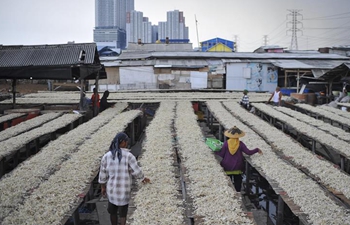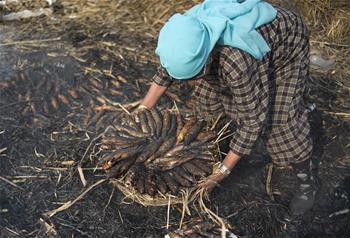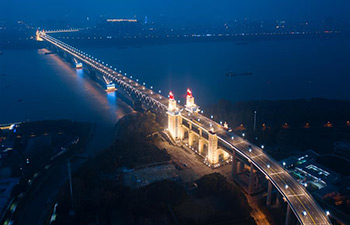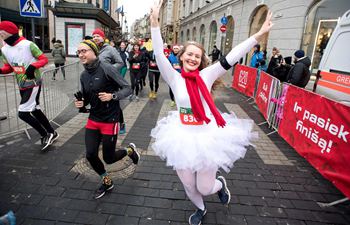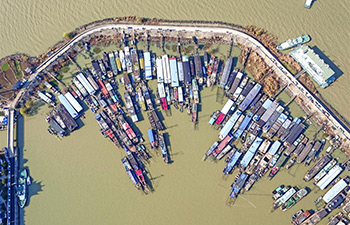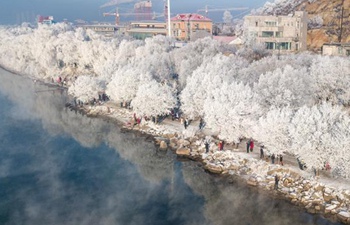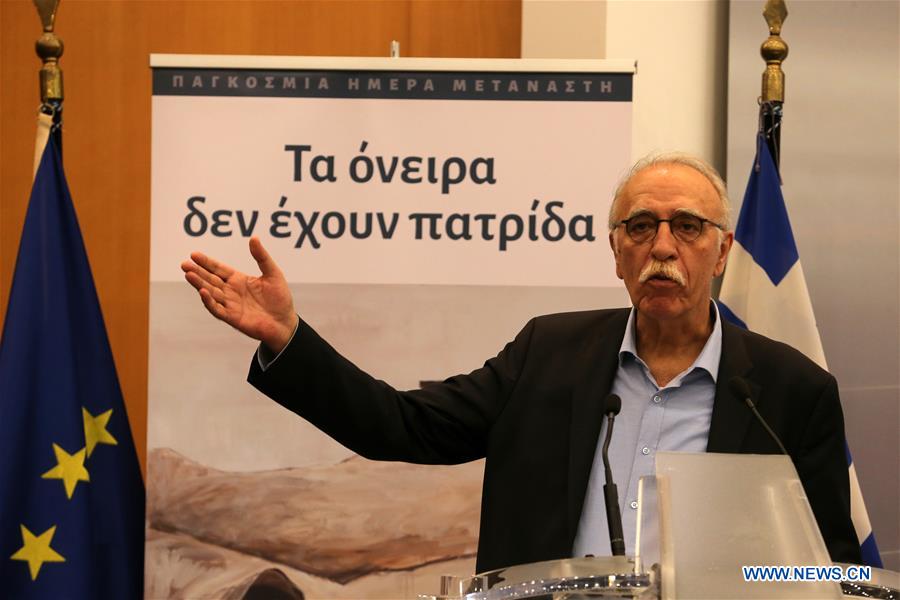 ?
?Greek Minister for Migration Policy Dimitrios Vitsas speaks at a press conference on the occasion of the International Migrants Day in Athens, Greece, on Dec. 18, 2018. Greek society has sent a clear message of solidarity to people seeking a better life away from their homelands, Greek officials told the press conference on Tuesday on the occasion of International Migrants Day, observed on Dec. 18 each year since 2000. During the eight years of the debt crisis, Greece has been working systematically towards the smooth integration of migrants in difficult circumstances. The country is seeking prosperity for all without discrimination, Greek Minister for Migration Policy Dimitrios Vitsas said at the event. (Xinhua/Marios Lolos)
By Maria Spiliopoulou
ATHENS, Dec. 18 (Xinhua) -- Greek society has sent a clear message of solidarity to people seeking a better life away from their homelands, Greek officials told a press conference here on Tuesday on the occasion of International Migrants Day, observed on Dec. 18 each year since 2000.
During the eight years of the debt crisis, Greece has been working systematically towards the smooth integration of migrants in difficult circumstances. The country is seeking prosperity for all without discrimination, Greek Minister for Migration Policy Dimitrios Vitsas said at the event.
"Greece, as a country which has migrants all over the world (the number of Greeks living abroad is as big as its population) and which has received tens of thousands of migrants (over 560,000 are currently living here), is opening its arms and acknowledges their rights and tries to help them," the Greek minister told journalists.
Vitsas reiterated a plea to address xenophobia and boost cross-border cooperation to effectively solve a common challenge.
"Europe's problem is not migration, but inequality, social inequality," Vitsas stressed, decrying the rise of racism, while welcoming the first ever Global Compact for Safe, Orderly and Regular Migration, which was adopted by the United Nations Intergovernmental Conference on Migration in Marrakech, Morocco, earlier in December.
"The international community has made a decisive step in the right direction to manage the global phenomenon of migration," he said, underlining that "the solution to the migration issue is legal and safe migration flows."
With more than half a million people, mainly from Balkan and eastern European countries, migrating to Greece since the 1990s, the country faced a major challenge in the past three years, when more than one million refugees and migrants from Asian and African countries landed on its shores.
People fleeing war zones and extreme poverty, seeking a better future, passed through Greece to the countries of central and northern Europe. Hundreds perished in the Aegean Sea as victims of smugglers, while thousands suffered in overcrowded reception camps on the Greek islands amid squalid conditions for several months.
After the closure of borders along the Balkan route in February 2016 the influx dropped dramatically, but still thousands keep trying to reach Greece from Turkey and 60,000 have been stranded here, according to official figures.
Greece "conveys a strong message against fear, hatred and racism against the foreigner. The stance most Greek people held in recent years in the management of the refugee-migrant issue fills us with pride," said Fotini Pantiora, special secretary for crisis communications management at the Ministry of Digital Policy, Telecommunications and Media.
Greek officials and representatives of international organizations acknowledged that numerous problems still need to be solved, but the trend was positive.
"Greek society is more and more ready to the task of offering dignified reception places for refugees and migrants," UNHCR Representative in Greece Philippe Leclerc said at Tuesday's event.
"Greece is committed and understands the problem of migration," added Gianluca Rocco, chief of the International Organization for Migration's (IOM) mission in Greece.
"Dreams do not have one home" was the main slogan of the event in Athens.
Mohammand Mahdi Hossaini, 18, a refugee from Afghanistan made the perilous journey to Europe with his family and reached Greece in March 2016. He saw people perish in the waters while they were crossing the Aegean Sea.
At the event he talked about his dream in fluent Greek and introduced himself with the Greek name he adopted: Orpheas.
"We had a country, we had homes, but we were forced to leave our motherland... We did not come here to steal anybody's country," he said.
"Those of us who wish to stay in Greece want to live in houses, see our children go to school, we want to become a work force for the country which welcomed us... There should be more cooperation between locals and migrants and refugees so that we can build a better country here," he stressed.
Orpheas has been staying in a reception center near Athens. He volunteers as a translator at the camp's clinic. He wants to become a neurosurgeon and hopes that soon he will be able to embrace his father again in Germany, as his request for family reunification is being assessed.

